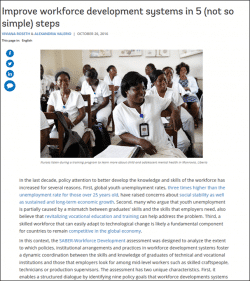
Policy highlights:
- Growing global youth unemployment is cause for great concern. It is argued that this growth can partially be attributed to a mismatch between graduates’ skills and the skills that employers need. Consequently, policy attention on improving the knowledge and skills of the workforce has increased.
- The SABER-Workforce Development Assessment, which has been implemented in 35 countries, analyses the extent to which policies help to adequately match graduates’ skills with employers’ demands.
- The assessment identified five policy areas in which technical assistance, cross-country learning, and policy intervention are needed; it recommends the following: 1) workforce development strategies should be accompanied by political will, sufficient funding, and solid monitoring at all relevant levels; 2) employers should be actively engaged in policymaking and training design (which requires incentives that institutionalize the relationship with employers); 3) investments should be made in modern programmes to enhance the appeal of vocational education and training for youth; 4) quality standards and performance measurements should be established, because such information motivates prospective students and employers to participate; and 5) efforts should be made to establish national systems for data collection and analysis to improve current practices and inform policymakers.








